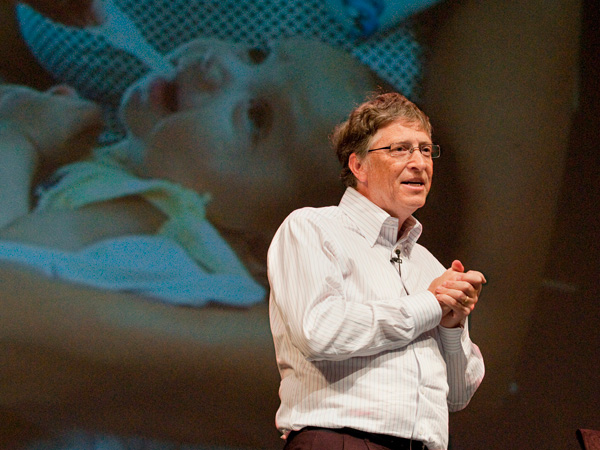Bill Gates pushes students to focus on the 'important problems'
While he's not opposed to drugs that fight baldness, the billionaire said more brainpower should be directed toward global health crises and broken schools than the cosmetic worries of developed nations.
He's a Harvard dropout who revolutionized how people interact with computers and a very rich man who has changed the face of philanthropy.
Now Bill Gates wants to inspire college students to make their own marks on the world by devoting their time, brainpower and future incomes to solving what he calls the world's greatest problems: poor healthcare and broken school systems.
"Are the brightest minds working on the most important problems?" he asked a capacity crowd Monday at Stanford's Memorial Auditorium. "My view is that we could do a lot better on this and it would make a huge difference."
Citing the contrast between the proliferation of anti-baldness drugs in America and a lack of vaccines to prevent millions of young children from dying in developing countries, Gates urged students to focus on the life-and-death challenges facing the world.
"It's unbelievable how few smart people" are working on global health issues, he said. The sentiment was echoed later in his speech when he talked of the need to figure out how to stock schools with the best teachers: "You'd be amazed at how little work there is in this area," he said.
Gates told Stanford a story about seeing charity through the eyes of his child.
Gates' talk at Memorial Auditorium, "Giving Back: Finding the Best Way to Make a Difference," was this year's Payne Distinguished Lecture sponsored by Stanford’s Freeman Spogli Institute for International Studies.
It was also the second stop of Gates' five-college, three-day tour that kicked off Monday at the University of California-Berkeley, to promote the kind of work the Bill and Melinda Gates Foundation is doing.
"When I dropped out of college, I told my dad I'd go back," Gates said. "And I'm doing that a day at a time."
During his junior year at Harvard, Gates left school to focus on Microsoft Corp., the company he started in 1975 with his childhood friend Paul Allen. The money he made running the software giant propelled him to the top of Forbes magazine's list of the world's richest people. With a net worth of $53 billion, he currently holds the No. 2 slot.
He's directed much of his wealth toward philanthropy.
With assets of about $34 billion, the Gates Foundation has given out about $21 billion in grants, including more than $3.6 billion to organizations working on expanding childhood immunization, eradicating polio and combating malaria.
Bill and Melinda Gates have pledged to spend more than $10 billion to develop and deliver new vaccines over the next decade, and the foundation plans to spend $2 billion on improving educational opportunities.
After his speech, Gates took on a dozen topics brought up by students that ranged from his opinion of the iPad recently launched by Microsoft rival Apple ("I love the fact there's new devices out there!") to answering those who have criticized him for supporting charter schools ("The idea that you should have rigidity with no experimentation … that's what the non-charter movement is").
But his message kept returning to philanthropy. He told students to visit the Gates Foundation's Facebook page and post answers to the following questions: What problem are you working on? What draws you to it? How will you draw other people to it?
While he encouraged students to satisfy their philanthropic goals by following his path of making money in the private sector and donating a portion of it to various causes, he also gave some advice to those looking to make a career out of do-gooding: Get hands-on experience, and commit to it for a while.
"When we look at people's resumes" at the Gates Foundation, he said, "we look to see if there was a long amount of time that they were willing to get their hands dirty and do the work."


Share This Story